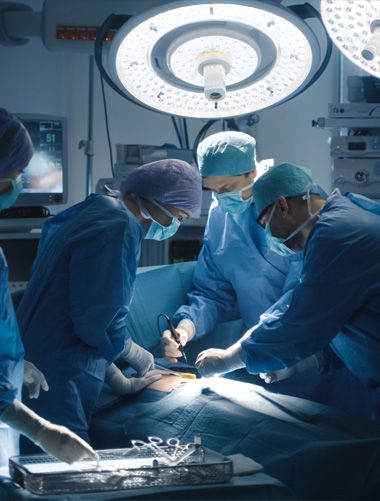

A kidney transplant surgery which is also known as renal transplant is a surgical procedure in which a patient’s diseased or failed kidney is removed and replaced by a healthy kidney either donated by a living person or a deceased person. For people who are suffering from chronic kidney disease (CKD), their kidney function declines over time within months or years, up to the point where it cannot be cured with any treatment approach and they are left with only two options, dialysis and kidney transplant. This is known as end-stage renal disease (ESRD). Our kidney contains millions of tiny filters known as nephrons, these nephrons filter the blood and remove the waste materials from the blood which is expelled from the body in the form of urine. But if the nephrons are damaged, they don’t function properly, and this results in the shutting down of the nephrons. After a certain point, the unaffected nephrons are so limited that they cannot filter the blood effectively hence resulting in kidney failure.
The only management option for a patient with a failed kidney is to indulge in the dialysis procedure regularly or to opt for the kidney/renal transplant procedure. Kidney transplant operation is the best option because it has several advantages over dialysis. Unlike dialysis, transplantation has a long-term survival rate and provides dietary and fluid freedom. According to the studies, the patients who have opted for kidney replacement surgery have a long-term survival rate as compared to the patients who have regular dialysis. Kidney transplant surgery in India is a well well-established surgical procedure with a lot of government-funded institutions as well as private hospitals. India ranks 2nd in the world for kidney transplant surgery. The total number of transplants performed in the 5 years (between 2018 and 2022) is 58,749 and the donations were made by 52,594 people. Most of the donations were made by the living donors.
The kidney replacement surgery requiring patients is increasing globally and especially in the African continent. However, Africa still has a long way to go because the transplantation demand is increasing in African countries but there is a lack of organ donors in the African nations. People with kidney diseases often travel to India from all around the world including African countries like Ghana, Keyna, Tanzania, and Congo because the procedure is widely available in India at a very cost-effective price. The availability of a donor is easy in India as compared to Africa. The availability of advanced kidney transplant surgery techniques, surgeon’s expertise, and post-transplant care has made India a safe country to receive this surgery. The living donor kidney transplant as well as deceased donors are also available in India and the patients don’t have to wait much longer.

The kidney serves some of the most important functions accountable for the survival of any ordinary human being. If the kidney fails to work, the chances of livelihood of the person drop drastically, which could lead to a patient's death. The vital functions that the human kidney serves are:
When the kidney disease is at its early stage, you might not have show any signs or symptoms. The symptoms start to appear as the disease progresses and as it reaches the end stage or the chronic stage, it shows the signs and symptoms of kidney failure. The most common symptoms that you might have are as follows:

When a person has kidney disease, it affects the function of the kidney by causing damage to the kidney which worsens over time. As it continues to affect the kidneys, the damage continues to progress even after the disease is treated. There are various conditions that can lead to end-stage renal disease, the primary ones being:

The blood group of a patient or a recipient should be the same as the blood group of a donor. If the blood group of the patient and donor is different, the patient will have to undergo plasmapheresis therapy before the kidney replacement surgery. The patient needs to have a blood group compatible healthy kidney donor from family. In case they do not have blood group compatible donor, patient may need to undergo Plasmapheresis therapy before kidney transplant.
Donors should be between 18 to 65 years of age and willing to donate the kidney by their own wish. The donor should be healthy and fit and their kidney function should be normal. The blood group of the donor should match the recipient (patient). In addition to this, the donor and recipient will have to undergo detailed tests, which could take 4-5 days (depending on what is found in investigations), prior to transplantation.
1) The embassy in Delhi will certify all the proofs certificates and documents of the relationship between the donor and the recipient. The living donor kidney transplant can be done only after the government authorization committee approves the donor.
2) Documentary evidence of relationship e.g., relevant birth certificates and marriage certificate.
Documentary evidence of identity and residence of the proposed donor e.g. Passport or Driving License and Bank Account and a family photograph depicting the proposed donor and the proposed recipient along with another near relative.
3) The donor's first relative should be available before the kidney transplant operation committee meeting to give consent. In case the donor is married then the spouse has to be present as an attendant. In case the donor is unmarried then the father, mother, real brother, or sister has to be present as an attendant.
4) The patient and the donor must have visited India on a medical visa.
The donor of the kidney plays an important part in the entire kidney transplant surgery process. In addition to the recipient’s overall health, the success of renal transplant surgery is dependent on the kidney that is donated by the donor which will be transplanted into the body of a patient. There are two types of kidney transplant donors which are mentioned below.

The living donor kidney transplant can include anyone who is alive and willing to donate their kidney. This could include the patient's family members, including brothers, sisters, parents, children (only above 18 years), cousins, or a spouse or close friend who may wish to donate a kidney. That person is called a 'living donor."
However, the living kidney transplant donor needs to meet a certain medical health bar in order to qualify for kidney donation. A living donor ideally should have excellent health, good information about the process, and the ability to give informed consent.
A deceased donor is someone who has died recently and has given consent while he/she was alive to donate his/her organs. If the donor has died before giving the consent, then we can take the consent of their family members. There are certain organisations that conduct kidney donation at the time of death of a person with their or their family’s permission. Once the permission for kidney donation is granted, the kidneys of the dead person are removed can stored until a recipient is selected.
Every transplant center has its own guidelines which help in deciding whether you are eligible for a kidney transplant surgery in India. The following are the common tests that you will need to undergo in order to be the right candidate.
The medical team will assess your medical history including any surgical history. You will be asked bout all the treatments or surgeries you have had in the past along with the illnesses. In addition to this, sometimes the family history is also asked.
It is to check that your major organs and different body parts are fine and that you don’t have any other existing medical condition.
This test is important to assess whether you are emotionally prepared for the kidney transplant surgery followed by the post-transplant care and living with a new kidney for the rest of your life.
This is the most important test that is compulsory before the kidney transplant surgery. The compatibility tests are performed to make sure that the donor’s kidney is compatible with the recipient/patient. Following are the compatibility tests that you need.
■ Blood typing: It is the test to know whether the blood type of a donor and recipient match or not. Although with the innovative techniques in India, a renal transplant from an incompatible blood type donor is possible, it is much easier if the blood type of the recipient and donor match.
■ Tissue typing: This test is done to see if the tissues of the patient’s body match with the donor’s tissues. If it’s a good match, then the recipient's body is less likely to reject the donor’s kidney.
■ Crossmatching: Our body’s nature is to make antibodies in response to the antigens. The antigens are anything that is not related to our body and is a foreign material. It could be anything that invades into our body such as bacteria, germs, etc. The antibodies will attack and kill these foreign bodies. Similarly, it can also reject the kidney that is transplanted from the donor to the recipient. To avoid this, the crossmatching test is required to make sure that you do not contain the antibodies of the donor kidney.
Sometimes, depending on the patient’s health condition, additional tests like chest x-ray, echocardiogram, electrocardiogram, cardiac stress test, cancer screening, colonoscopy, gynecological exam, prostate exam, dental evaluation, etc. are also needed.
The doctor will also run some tests such as renal nuclear scan, kidney ultrasound with Doppler, kidney biopsy, CT scan, MRI scan, etc to evaluate the health and organs of the patient’s body before the kidney replacement surgery. The compatibility test are for both, the donor as well as the recipient.
After the tests of the recipient and donor are completed, and if they both are found fit, it means that the match has been made and it is time to perform the surgery. The complete kidney transplant operation can take about 3 to 4 hours. The key steps are removing the donor’s kidney or preparing it if it is previously removed and stored, preparing the recipient by giving them anesthesia and making the incision, removal of the patient’s diseased kidney, and implanting the donor’s kidney in the recipient. After that, the incision that was made to perform the surgery is closed with stitches.
There are two traditional methods and one innovative method by which the surgeon performs kidney transplant surgery. The traditional methods are open surgery and laparoscopic surgery and the innovative method is robotic-assisted surgery. The difference between these surgery methods is that open surgery needs to make a long incision on the patient's abdomen which is about 9 to 12 centimeters to perform the surgery whereas laparoscopic surgery can be performed by making small incisions of 6 centimeters. In robotic-assisted surgery, even small incisions which are tinier than laparoscopic incisions are made to perform the surgery.

CureIndia helps you choose the best kidney transplant doctor for your medical treatment. Most of the doctors in our associated hospitals have been internationally trained and are active members of many international medical councils and associations. Let's hear from some of the most reputed kidney transplant surgeons in India.




Many people from African nations like Nigeria, Sudan, Kenya, and Ethiopia visit India for kidney transplant surgery. The kidney transplant surgery in India is highly profitable for patients coming from different countries as they receive cost-effective and premium treatments. Indian surgeons are globally trained and experienced, with good knowledge of their area. In addition to the basic procedures for kidney transplants, India also provides robot-assisted kidney transplants, BAK, and kidney regeneration technology. The cost of kidney transplant surgery in India is mentioned below.
| Treatment | Cost in India | Stay in India |
|---|---|---|
| Kidney Transplant Surgery in India | $13,500 | 45-60 Days |
Kidney Transplant surgery is one of the most delicate surgeries pertaining to the human body. After the completion of the transplant, an intensive care has to be taken in order to allow the new kidney to function with full efficiency. After kidney operation, the patient is expected to:
Your surgeon will prescribe you some medications that you will have to consume in order to manage the post-surgical pain, immunosuppressants to keep your body from rejecting the new kidney, and any other medication you might need after kidney operation. You will be discharged from the hospital after 5 to 7 days of the surgery, after which you will have to visit the hospital regularly for follow-up checkups. Your doctor will give you the appointments twice a week initially for over a month and then the frequency of appointments will reduce.
Kidney replacement surgery is a major surgery that is only possible when the right donor is available. It is very important to act as soon as possible to receive the kidney transplant operation. India ranks 2nd in the world in providing kidney replacement therapy due to which many international patients visit India every year on a medical tourist visa. The reason is not only the high-quality medical service provided by the Indian kidney transplant hospitals but also the affordably low kidney transplant cost. Not only the transplant surgeries, but the Indian hospitals provides a wide variety of different treatments and surgeries at a very profitable cost including the diagnostic tests. Healthcare providers are actively engaged in research and constantly striving to find the finest and most novel kinds of treatments and medical therapies. Thanks to their years and years of experience, dedication, and learning which have helped India grow as a nation and able to provide premium kidney transplant surgery care to both, national as well as international patients


Successful Liver Transplant Surgery in India
Share Your Reports
Minimally invasive Liver donor surgery
Book appointment